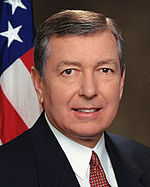Sami Al-Arian indictments and trial began on February 20, 2003, the U.S. Department of Justice announced that Sami Al-Arian had been arrested as the alleged leader of the Palestine Islamic Jihad (PIJ) in the U.S., and Secretary of the PIJ's central worldwide governing group (the "Shura Council").[1][2] It also charged three others living in the U.S., as well as four outside the U.S.[1][2] These included Al-Arian's long-time top USF/WISE associate Ramadan Abdullah Shallah, who had been designated a Specially Designated Terrorist by the U.S. in 1995, and was accused of being Secretary General of the PIJ.[1][2][3]
The PIJ was identified as an international terrorist organization, with cells throughout the world, that supports jihad and martyrdom, responsible for the deaths of among other Americans Alisa Flatow (20 years old) and Shoshana Ben-Yishai (16 years old).[1][2][4] In 1995 the PIJ, Syrian-based and largely financed by Iran, had been designated a "Specially Designated Terrorist" by the U.S., and in 1997 it had been designated a "foreign terrorist organization".[2][3][4][5][6]
A 50-count indictment returned by a federal grand jury in Tampa charged the defendants under the Racketeer Influenced and Corrupt Organizations Act (RICO) with operating a racketeering enterprise from 1984 that engaged in violent activities, as well as: conspiracy within the U.S. to kill and maim persons abroad, conspiracy to provide material support and resources to PIJ, conspiracy to violate emergency economic sanctions, engaging in various acts of interstate extortion, perjury, obstruction of justice, and immigration fraud.[1][2][4] The indictment alleged a ten-year conspiracy to support PIJ worldwide, help solve internal PIJ disputes and financial problems, help disseminate PIJ claims it was responsible for terrorist attacks in Israel, and raise funds within the U.S. for "violent jihad."[2] It alleged numerous PIJ-associated terrorist acts, resulting in the murders of over 100 people in Israel and the Occupied Territories.[1][2] It claimed that PIJ, ICP, and WISE operated together as an illegal enterprise.[2][4] It also alleged that the defendants used USF, where some of them were teachers or students, as cover and as a means to bring other PIJ members into the U.S., purportedly for academic meetings and conferences.[2][4]

John Ashcroft
Attorney General John Ashcroft said that Al-Arian and his co-defendants played:
a substantial role in international terrorism. They are 'material supporters' of foreign terrorist organizations. They finance ... and assist acts of terror. Our message to them is clear: We make no distinction between those who carry out terrorist attacks, and those who knowingly finance, manage, or supervise terrorist organizations.[1]
Al-Arian told reporters: "it's all about politics", and his attorney labeled the indictment a "work of fiction."[7]
The indictment was later expanded into a 53-count superseding indictment in September 2004.[4] It charged Al-Arian with: 1) conspiracy to commit racketeering; 2) conspiracy to murder or maim persons outside the U.S.; 3) conspiracy to provide material support to a foreign terrorist organization (the PIJ); 4) conspiracy to make and receive contributions of funds, goods, and services for the benefit of Specially Designated Terrorists (the PIJ); 5) use of the mail or any facility in interstate or foreign commerce to promote unlawful activity; 6) providing material support to a foreign terrorist organization; 7) money laundering; 8) attempt to procure naturalization unlawfully; and 9) obstruction of justice.[4]
- ^ a b c d e f g U.S. Department of Justice (February 20, 2003). "Members of the Palestinian Islamic Jihad Arrested; Charged with Racketeering and Conspiracy to Provide Support to Terrorists" (PDF). Press Release. Retrieved March 8, 2010.
- ^ a b c d e f g h i j "U.S. v. Al-Arian; Indictment; U.S. District Court, Middle District of Florida, Tampa Division" (PDF). February 19, 2003. Retrieved March 8, 2010.
- ^ a b Mintz, John (June 5, 2005). "Trial to Reveal Reach Of U.S. Surveillance". The Washington Post. Retrieved March 8, 2010.
- ^ a b c d e f g "U.S. v. Al-Arian; Superseding Indictment" (PDF). September 2004. Retrieved March 8, 2010.
- ^ "Plea Agreement; U.S. v. Al-Arian" (PDF). February 28, 2006. Archived from the original (PDF) on March 1, 2012. Retrieved March 8, 2010.
- ^ Miller, Judith (July 23, 2002). "Traces of Terror: The Money Trail; A Professor's Activism Leads Investigators to Look Into Possible Terrorism Links". The New York Times. Retrieved March 9, 2010.
- ^ Isikoff, Michael (March 3, 2003). "Hiding in Plain Sight: Did a Muslim professor use activism as a cloak for terror?". Newsweek. p. 27.